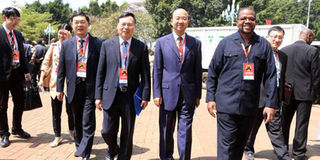Jubilee looks to the Communist Party for lessons

Chinese envoy Liu Xianfa (centre) with representatives of the Communist Party arrive at Kasarani on September 9, 2016. PHOTO | JEFF ANGOTE | NATION MEDIA GROUP
What you need to know:
- Once they return from China, the officials will go to their counties to introduce a uniform mode to create cohesion in the giant Jubilee Party.
- This training will be complemented by about 300 Chinese officials from the Communist Party who are expected to travel to Kenya.
- There are those who point out that China is not the best country to look up to when it comes to democracy since the state maintains a tight control in the country.
- Parties like ODM tend to associate themselves with the African National Congress and Chama Cha Mapinduzi in Tanzania.
- In China, there are eight other parties in the political system but they are almost entirely subservient to the Communist Party.
At least 50 members of the newly-launched Jubilee Party are preparing for a trip to China to deepen ties with the Asian giant’s Communist Party.
The Sunday Nation has learnt that 47 county co-ordinators will be leaving for Beijing as soon as President Uhuru Kenyatta and Deputy President William Ruto unveil what is expected to be a long list of officials and the leadership structure cascading down to the county level. The trip is meant to train the Jubilee officials on effective ways of running the party.
Mr Kenyatta and his deputy were set to name the officials last weekend when they launched the party but did not after some of the parties that merged into the new outfit staked claim to top positions and the deadlock had not been broken by then.
Once they return from China, the officials will go to their counties to introduce a uniform mode to create cohesion in the giant Jubilee Party.
This grassroots training, according to a source who spoke in confidence, will be complemented by about 300 Chinese officials from the Communist Party who are expected to travel to Kenya.
“They will train on general organisation, mobilisation and capacity building,” a senior member of the ruling party familiar with preparations for the exchange programme, who did not want to be named discussing internal deliberations, told the Sunday Nation.
At a joint press conference with Chinese Communist Party officials last month, Meru Senator Kiraitu Murungi, who co-chaired the steering committee on the Jubilee merger, said: “China is Kenya’s leading trade and development partner. We are happy that we are going to sign a new chapter of political co-operation.”
It is instructive to note that Mr Peng Qinghua, the secretary of the Guangxi Zhuang Autonomous Region’s committee, led a delegation from the world’s most populous country and spoke during the launch at Kasarani Stadium on September 10.
“Communist Party of China is ready to work with Jubilee Party to realise change and boost experience in governance to promote China-Kenya partnership,” Mr Zhuang said.
ERODE DEMOCRATIC GAINS
Since President Mwai Kibaki opened doors for the Chinese in 2003, they have had a strong foothold in the country, a trend President Kenyatta has displayed no sign of reversing with major construction works like the standard gauge railway being put up with the help of the Asians.
But there are those who point out that China is not the best country to look up to when it comes to democracy since the state maintains a tight control in the country of about 1.4 billion people with the Communist Party dominating all spheres of life.
Prof David Kikaya, an International Relations expert from the United States International University, laments that it was unfortunate that Jubilee chose to associate with a party that curtails civil liberties.
“The Communist Party operates like Kanu when Kenya was a single party state. It is the alpha and omega in China operating more in the fashion of what President George Bush Jnr would say, ‘you are either with me or with the terrorists’ (after the September 11, 2001 terrorist attack in the US),” argues Prof Kikaya.
He says the trend, if adopted by other political parties, could erode democratic gains the country has made with the new Constitution.
There have been suggestions within Jubilee power corridors that China might support Mr Kenyatta’s re-election campaign but it is a subject no one wants to discuss.
Nonetheless, the trend is not unique to Jubilee. Parties like ODM led by Mr Raila Odinga tend to associate themselves with the most dominant party in South Africa, the African National Congress, and closer home Chama Cha Mapinduzi in Tanzania.
Both Mr Kenyatta and Mr Ruto have said they have no interest returning the country to one party rule and that the motivation to form Jubilee is unity of the country.
In China, there are eight other parties in the political system but they are almost entirely subservient to the Communist Party.
They are the Revolutionary Committee of the Kuomintang, China Democratic League, China Democratic National Construction Association, China Association for Promoting Democracy, Chinese Peasants’ and Workers’ Democratic Party, China Zhi Gong Party, Jiusan Society and Taiwan Democratic Self-Government League.
In an interview with Reuters in 2014 during a visit to Europe, Chinese President Xi Jinping, the General Secretary of the Communist Party of China, said China experimented in the past with various political systems, including multi-party democracy, but that did not work.
He warned that copying foreign political or development models could be catastrophic for his country. His regime is known to clamp down on dissent with brute force.





